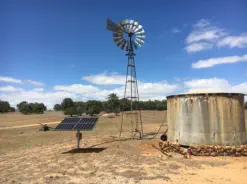Welcome to the Solar Pump Doctor
Your one stop shop for solar pumps & repairs From new installations to upgrades and repairs, the Solar Pump Doctor brings over 25 years experience to your door. Operating out of West Perth and with a base in Yallingup we provide first class service whatever your solar pumping needs. We service an area of 500kms and more around Perth.

Our Company
Experience and Reliability
Solar Pump Doctor has more than 25 years in the water pumping and solar industry. We work with the leading manufacturers and suppliers of solar pumping equipment to ensure the solutions we supply are the best in the business. We understand what is required to handle your sites conditions and the water challenges land owners face. We recognise the importance of timeliness of service and the reliability required in your solar pumping system. From designing new systems to maintaining existing set ups, you can be sure that when you call us, you’ll receive the best service in the business!
What We Offer
Leading Edge Solar Pump Solutions
Solar pump systems have revolutionised the pumping scene. Cut costs, reduce your ecological impact, and gain mastery over your energy cost starting now!
What We Do
Our Projects
Our team is dedicated to delivering top-tier solar pumping systems.Stock Water Systems
Providing water for stock animals to drink is a critical aspect of sustainable agriculture in rural Australia. Given the often harsh and variable climate conditions that characterize much of the Australian landscape, access to reliable and clean water sources is vital for the health and productivity of livestock. Water is essential for maintaining proper hydration, which directly impacts body temperature regulation, digestion, and overall metabolic function in animals. Without an adequate supply of water, livestock can suffer from dehydration and stress, leading to decreased productivity, poor weight gain, and increased susceptibility to disease. Thus, ensuring a constant water supply is foundational for the success of livestock farming. Moreover, the high evaporation rates and periodic droughts experienced in many rural regions of Australia can severely limit natural water sources. As agriculture is a primary economic driver in these areas, the absence of water not only threatens the welfare of animals but also jeopardizes the livelihood of farmers. Solar powered stock water systems provide this essential supply of clean potable drinking water at low overall cost.Salt Land Reclamation
Salt land reclamation in rural Australia is a critical environmental and agricultural practice aimed at restoring and rehabilitating land affected by soil salinity. This issue primarily arises due to factors such as irrigation, land clearing, and changes in land use, which disrupt the natural hydrology and lead to the rise of saline groundwater. As a result, large areas of farmland can become unproductive, posing significant challenges to rural communities and ecosystems. The reclamation process involves various techniques, including the use of salt- tolerant plant species, improving drainage systems, and implementing soil amendments to mitigate salinity levels. These practices not only restore agricultural productivity but also enhance soil fertility and promote biodiversity. Salt land reclamation is vital for a number of reasons. It helps secure food production and economic viability for farming communities by increasing the available area for cultivation. Secondly, it improves water quality by reducing salt run off into waterways, which benefits local ecosystems. Solar powered reclamation equipment can fulfil this important task both reliably and economically.
Years of
Experience
25
Happy Clients
390
Projects
Completed
320
Business Partners
17
TESTIMONIALS
What Our Clients Say
We had been told by other pump guys we needed to replace our whole solar system which was about 15 years old. Chris called past when he was working nearby and confirmed our solar array was OK and that we needed to only replace the pump equipment. Two years on and the system hasn’t missed a beat! . Max Fry Shenfield Farm - Benger
Service Offerings
Solar Panels Pumping Design Services Installation Maintenance RepairsSales Office
Tel: +61 407 311 147 Email: chris@solarpumpdoctor.com.au Web: www.solarpumpdoctor.com.au Address: 17 Eden St, West Perth WA 6005, Australia
© Copyright 2025 Solar Pump Doctor | Westcountry

Systems
We’ll work closely with you to understand your requirements and using our extensive industry knowledge and contacts, design a system that is both economical and efficient.Installations
Our team will install and commission your new system providing everything you need including trenching, pipework and electrical connections.Repairs
We stock a wide range of spares for the most popular pump brands including Lorentz, Sun Mill, Sunpump, Dawson and more. We provide maintenance, return to base and on-site repair.
01
Top Reasons to Choose Us
The Solar Pump Doctor offers the most efficient, economical, reliable service in the business!We've Got Your Back
We accompany you at every step, from initial planning to assistance with any necessary permits and documentation.
02
03
04
Save Your Money
Expect to save $$$ on your electricity pumping bills with our assistance.Installation Option
We can install your solar pump system for you. Our preference is to supply the equipment and install however we can also install equipment you may have purchased elsewhere.Up to 20-Year Warranty
Our equipment comes with extensive manufacturers warranties on solar panels and pumps.
The No 1 in Emergency Breakdown Assistance





Welcome to the Solar
Pump Doctor
Your one stop shop for solar pumps & repairs From new installations to upgrades and repairs, the Solar Pump Doctor brings over 25 years experience to your door. Operating out of West Perth and with a base in Yallingup we provide first class service whatever your solar pumping needs. We service an area of 500kms and more around Perth.
Our Company
Experience and Reliability
Solar Pump Doctor has more than 25 years in the water pumping and solar industry. We work with the leading manufacturers and suppliers of solar pumping equipment to ensure the solutions we supply are the best in the business. We understand what is required to handle your sites conditions and the water challenges land owners face. We recognise the importance of timeliness of service and the reliability required in your solar pumping system. From designing new systems to maintaining existing set ups, you can be sure that when you call us, you’ll receive the best service in the business!

What We Offer
Leading Edge Solar Pump
Solutions
Solar pump systems have revolutionised the pumping scene. Cut costs, reduce your ecological impact, and gain mastery over your energy cost starting now!
What We Do
Our Projects
Our team is dedicated to delivering top-tier solar pumping systems.Stock Water Systems
Providing water for stock animals to drink is a critical aspect of sustainable agriculture in rural Australia. Given the often harsh and variable climate conditions that characterize much of the Australian landscape, access to reliable and clean water sources is vital for the health and productivity of livestock. Water is essential for maintaining proper hydration, which directly impacts body temperature regulation, digestion, and overall metabolic function in animals. Without an adequate supply of water, livestock can suffer from dehydration and stress, leading to decreased productivity, poor weight gain, and increased susceptibility to disease. Thus, ensuring a constant water supply is foundational for the success of livestock farming. Moreover, the high evaporation rates and periodic droughts experienced in many rural regions of Australia can severely limit natural water sources. As agriculture is a primary economic driver in these areas, the absence of water not only threatens the welfare of animals but also jeopardizes the livelihood of farmers. Solar powered stock water systems provide this essential supply of clean potable drinking water at low overall cost.Salt Land Reclamation
Salt land reclamation in rural Australia is a critical environmental and agricultural practice aimed at restoring and rehabilitating land affected by soil salinity. This issue primarily arises due to factors such as irrigation, land clearing, and changes in land use, which disrupt the natural hydrology and lead to the rise of saline groundwater. As a result, large areas of farmland can become unproductive, posing significant challenges to rural communities and ecosystems. The reclamation process involves various techniques, including the use of salt-tolerant plant species, improving drainage systems, and implementing soil amendments to mitigate salinity levels. These practices not only restore agricultural productivity but also enhance soil fertility and promote biodiversity. Salt land reclamation is vital for a number of reasons. It helps secure food production and economic viability for farming communities by increasing the available area for cultivation. Secondly, it improves water quality by reducing salt run off into waterways, which benefits local ecosystems. Solar powered reclamation equipment can fulfil this important task both reliably and economically.

Years of
Experience
25
Happy Clients
390
Projects
Completed
320
Business Partners
17
TESTIMONIALS
What Our Clients Say
We had been told by other pump guys we needed to replace our whole solar system which was about 15 years old. Chris called past when he was working nearby and confirmed our solar array was OK and that we needed to only replace the pump equipment. Two years on and the system hasn’t missed a beat! . Max Fry Shenfield Farm - Benger
Service Offerings
Solar Panels Pumping Design Services Installation Maintenance RepairsSales Office
Tel: +61 407 311 147 Email: chris@solarpumpdoctor.com.au Web: www.solarpumpdoctor.com.au Address: 17 Eden St, West Perth WA 6005, Australia
© Copyright 2025 Solar Pump Doctor | Westcountry
Systems
We’ll work closely with you to understand your requirements and using our extensive industry knowledge and contacts, design a system that is both economical and efficient.Installations
Our team will install and commission your new system providing everything you need including trenching, pipework and electrical connections.Repairs
We stock a wide range of spares for the most popular pump brands including Lorentz, Sun Mill, Sunpump, Dawson and more. We provide maintenance, return to base and on-site repair.Top Reasons to
Choose Us
The Solar Pump Doctor offers the most efficient, economical, reliable service in the business!
01
02
03
04
Save Your Money
Expect to save $$$ on your electricity pumping bills with our assistance.We've Got Your Back
We accompany you at every step, from initial planning to assistance with any necessary permits and documentation.Up to 20-Year Warranty
Our equipment comes with extensive manufacturers warranties on solar panels and pumps.Installation Option
We can install your solar pump system for you. Our preference is to supply the equipment and install however we can also install equipment you may have purchased elsewhere.
The No 1 in Emergency
Breakdown Assistance






































